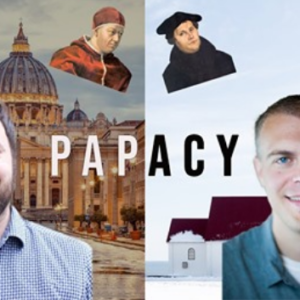I’ve been really excited to share this for days now (we recorded this past Thursday)… some of you may have watched the previous conversation that I had with the Baptist pastor and scholar Gavin Ortlund on the question of whether or not “to be deep in history is to cease to be Protestant.” At the end of that one, we were left wanting to talk with one another more, and particularly on the topic of the papacy. Here’s the fruit of that discussion. As before, the conversation is moderated by a Protestant (Austin Suggs, Gospel Simplicity) and Catholic (K. Albert Little, Cordial Catholic):
Either tonight or tomorrow, I’ll try to post a sort of supplement: a few things that I wish I had said, or said better. But for now, I’d encourage you to watch, and to comment here or there. I’m really interested in what you all think!

The most obvious problem I see in the premise that the early churches including Rome were lead by a plurality of leadership and that a hierarchical structure with a papacy at the top only developed later is that such a plural structure naturally diverges in the opposite direction. This is clearly seen in the Protestant model. The availability of scripture as arbiter of truth/unity has not slowed the divergence, but often used as a tool for justifying/rationalizing it. If the early church was essentially the Protestant model, the expected progression would be in the same direction only having started the divergence 1500 years earlier. Not even Constantine would have been able to pick up and reassemble the pieces, especially without a giant outcry from the churches. The only way that later unity could exist is that it existed and was preserved from the beginning.
An eye opening discourse. It becomes very clear how well meaning Christians in good faith talk past each other, i.e. “unity” clearly has a different meaning for Baptists than it does for Catholics. What a lot of Protestants need to know about Catholics is that for us, there is no where else to go, so the apparent stakes for us in conversations like these are very different. I get Gavin’s exasperation with the Church in terms of our wanting to advance the cause of unity among Christians. It is truly Catholic or nothing for us, and as true as that is the best we can hope for is to make it possible for Protestants to get why we might believe that if not agree with it.
Good talk!
The problem is Catholics mistake uniformity for unity!
“What a lot of Protestants need to know about Catholics is that for us, there is no where else to go, so the apparent stakes for us in conversations like these are very different”
Because you think the “church” is an organisation rather than the body of all believers. The later really is universal. That is the “true catholic” (univeral) church.
The problem with your opinion is the assumption of an incorporeal church. But Christ established one with adjudicatory power (Matthew 18) hence a corporeal Church.
The question is not even framed in sensible English: what is “true” in this context? Or is that a deliberate and “Jesuitical” twist in phraseology?
Just the serpent’s head Papal Audience Hall and the bizarre statue within it, should convince anyone that something is very rotten in Vatican City.
Of course these abominations started long ago: Bernini and his temple of the sun, with obelisk etc. etc. All hidden in plain sight from those who choose not to see. The whole sordid mess is detailed in “The Vatican Heresy” by Robert Bauval.
No wonder they tore down the ancient Basilica of Constantine to build it – that was more than a symbolic act.
If the eye be dark, how great then is that darkness.